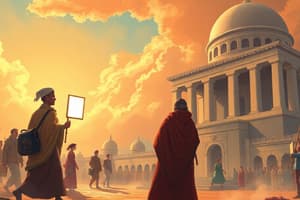Podcast
Questions and Answers
What is the definition of Culture?
What is the definition of Culture?
- Culture consumed mainly by upper classes.
- Ideas about what is right and wrong, good and bad.
- People who interact in a defined territory.
- The sum of practices, languages, symbols, beliefs, values, ideologies, and material objects that people create to deal with real-life problems. (correct)
What is Society?
What is Society?
People who interact, usually in a defined territory, and share a culture.
High culture is consumed mainly by upper classes.
High culture is consumed mainly by upper classes.
True (A)
Popular culture is consumed by all classes.
Popular culture is consumed by all classes.
Define Abstract.
Define Abstract.
What are Symbols?
What are Symbols?
What is Cooperation?
What is Cooperation?
What are Norms?
What are Norms?
Define Values.
Define Values.
What is Production?
What is Production?
Define Material Culture.
Define Material Culture.
What is Non-material Culture?
What is Non-material Culture?
What is Language?
What is Language?
What does the Sapir-Whorf thesis suggest?
What does the Sapir-Whorf thesis suggest?
Ethnocentrism is the belief that all cultures have equal value.
Ethnocentrism is the belief that all cultures have equal value.
What is Multiculturalism?
What is Multiculturalism?
What is Cultural Relativism?
What is Cultural Relativism?
Define Rights Revolution.
Define Rights Revolution.
What are Rites of Passage?
What are Rites of Passage?
What is Postmodernism?
What is Postmodernism?
Cultural lag is the tendency of symbolic culture to change more slowly than material culture.
Cultural lag is the tendency of symbolic culture to change more slowly than material culture.
Define Rationalization.
Define Rationalization.
What is Consumerism?
What is Consumerism?
What is Subculture?
What is Subculture?
Define Countercultures.
Define Countercultures.
Flashcards are hidden until you start studying
Study Notes
Culture and Society
- Culture encompasses practices, languages, symbols, beliefs, ideologies, and material objects, enabling adaptation to environments.
- Society is formed by individuals interacting in defined territories who share a common culture.
Types of Culture
- High culture is primarily enjoyed by upper classes, often associated with elite activities and tastes.
- Popular culture, or mass culture, is accessible and consumed by all societal classes.
Key Concepts in Culture
- Abstraction allows humans to create general ideas not tied to specific instances.
- Symbols are essential, conveying particular meanings through language and signs.
- Cooperation fosters complex social interactions among individuals.
Norms and Values
- Norms are generally accepted practices within a culture that dictate behavior.
- Values represent societal beliefs about right and wrong, including beauty standards.
Cultural Elements
- Production refers to the human ability to create and use tools for resource acquisition.
- Material culture includes tangible tools and objects aiding task completion.
- Non-material culture consists of symbols, norms, and other intangible cultural aspects.
Language and Communication
- Language is a structured system of symbols that facilitates communication of thoughts.
Cultural Theories
- The Sapir-Whorf thesis posits that language influences our perception of the environment and concepts.
- Ethnocentrism is the inclination to evaluate other cultures based on one’s own cultural standards.
- Multiculturalism advocates for educational curricula to reflect and honor the diversity of cultures.
Cultural Perspectives
- Cultural relativism asserts that all cultures should be viewed as equal in value.
- The rights revolution is a movement aiming for legal rights for socially excluded groups since the 1940s.
Cultural Practices
- Rites of passage are ceremonies marking significant life transitions, such as adulthood or death.
- Postmodernism blends various cultural elements while challenging traditional values and consensus.
Cultural Dynamics
- Cultural lag describes how symbolic culture tends to evolve slower than material culture.
- Rationalization involves using efficient methods to achieve objectives, sometimes leading to unintended adverse effects.
- Consumerism is a tendency for individuals to define their identity through their purchases.
- Subcultures exhibit distinctive values and norms within a larger culture, while countercultures actively resist and seek to alter dominant values.
Studying That Suits You
Use AI to generate personalized quizzes and flashcards to suit your learning preferences.




